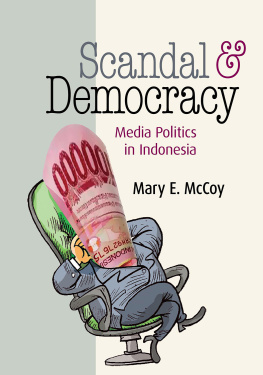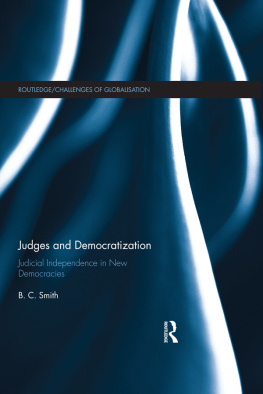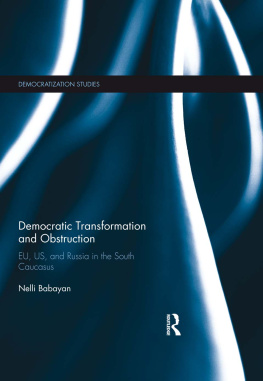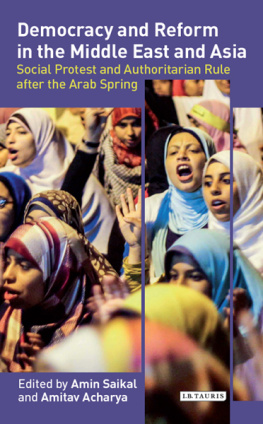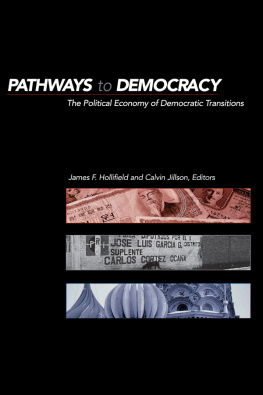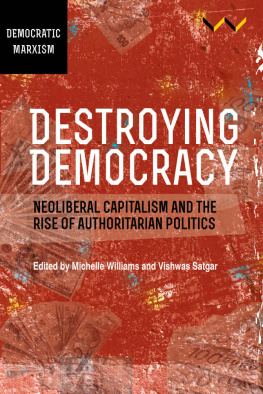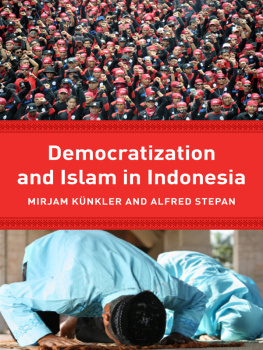Southeast Asia Program Publications Editorial Board
Mahinder Kingra ( ex officio )
Thak Chaloemtiarana
Chiara Formichi
Tamara Loos
Kaja McGowan
Copyright 2019 by Cornell University
All rights reserved. Except for brief quotations in a review, this book, or parts thereof, must not be reproduced in any form without permission in writing from the publisher. For information, address Cornell University Press, Sage House, 512 East State Street, Ithaca, New York 14850. Visit our website at cornellpress.cornell.edu.
First published 2019 by Cornell University Press
Printed in the United States of America
Library of Congress Cataloging-in-Publication Data
Names: McCoy, Mary E., 1968 author.
Title: Scandal and democracy : media politics in Indonesia / Mary E. McCoy.
Description: Ithaca : Southeast Asia Program Publications, an imprint of
Cornell University Press, 2019. | Includes bibliographical references and index.
Identifiers: LCCN 2018029443 (print) | LCCN 2018032259 (ebook) |
ISBN 9781501731051 (pdf) | ISBN 9781501731068 (epub/mobi) |
ISBN 9781501731037 (cloth : alk. paper) | ISBN 9781501731044 (pbk. : alk. paper)
Subjects: LCSH: Mass mediaPolitical aspectsIndonesia. | Press and politics
Indonesia. | PressIndonesiaInfluence. | DemocratizationIndonesia. |
Political corruptionIndonesia. | IndonesiaPolitics and government1998
Classification: LCC P95.82.I5 (ebook) | LCC P95.82.I5 M43 2019 (print) |
DDC 302.2309598dc23
LC record available at https://lccn.loc.gov/2018029443
Cover image by Hengki Irawan, illustrator for the Jogja Daily newspaper.
A CKNOWLEDGMENTS
The warmth and generosity of all of those who helped me in my research and writing continually amazed me, and I apologize to anyone I fail to mention here. In particular, I would like to thank my advisers at Northwestern UniversityJim Ettema, Tom Goodnight, Jim Schwoch, and Jeff Wintersfor their encouragement, suggestions, and careful readings of different drafts of this project. As the work continued, friends and colleaguesGwen Walker, Erin Cantos, Denise Lamb, Duncan McCargo, Susan Zaeske, Rob Asen, Marty Medhurst, and Karen Rebholtzgave helpful comments on my revised drafts. I am especially indebted to Eunsook Jung, who supported the project at critical moments and aided in the visual conceptualization of my argument, and Charlotte Frascona, who helped me think through various challenges at each stage.
I owe special thanks to all who gave me their time and provided insights in interviews and other conversations throughout my year of fieldwork in Jakarta and Manila. For sharing their files and allowing me an inside perspective on the workings of their organizations, I am grateful to Heru Hendratmoko, Lukas Luwarso, Ezki Suyanto, and Achmad Taufik of Aliansi Jurnalis Independen (AJI); the staffof Ramako-FM; Haris Jauhari and Despen Ompusunggu of Ikatan Jurnalis Televisi Indonesia (IJTI); S. Leo Batubara, Asep Sunara Martadiredja, and H. M. Purnowo of Serikat Penerbit Suratkabar (SPS); Ignatius Haryanto and Rusdi Marpaung (Ucok) of Lembaga Studi Pers & Pembangunan (LSPP); Lin Neumann of the Committee to Protect Journalists (CPJ); Andreas Harsono of Institut Studi Arus Informasi (ISAI); Budiman S. Hartoyo of Persatuan Wartawan Indonesia Reformasi (PWI-Reformasi); Kukuh Sanyoto of Masyarakat Pers dan Penyiaran Indonesia (MPPI); Hinca Pandjaitan of the Media Law Center; Ade Armando of the University of Indonesia; Magdalena Daluas of TVRI; Irawati Pratigno of AC Nielsen; Ilham Bintang of Persatuan Wartawan Indonesia (PWI); Syamsul Maarif of Tentara Nasional Indonesia (TNI); and the members of the Jakarta Media Center.
For their hospitality and insights while I was in Jakarta, many thanks to Alwi Dahlan, Aristides Katoppo, Atmakusumah Astraatmadja, Bambang Harymurti, Chusnul Mariyah, Daniel Dhakidae, Dede Oetomo, Djafar Assegaff, Eka Sitorus, Gunarso Kusumodiningrat, Ishadi S.K., Joesoef Isak, John McBeth, K. Basrie, Kathleen Reen, Marsillam Simanjuntak, Miriam Nainggolan, M.S. Zulkarnaen, Parni Hadi, Riza Primadi, Rosihan Anwar, Sumita Tobing, Trimoelja Soerjadi, Wimar Witoelar, Xanana Gusmo, and Yuli Ismartono. Thanks also to Teri Caraway, Beth Drexler, and Bronwyn Curran for their valuable friendship during our year of living through the turmoil and revelry of post-Suharto Indonesia. In Manila, I also benefited greatly from the counsel of Sheila Coronel, Melinda Quintos de Jesus, and Helen Mendoza.
Much love and gratitude to Jakarta friends Delfina Yuniara, Teguh Dewabrata, and Dameria Nainggolan, who taught me so much and helped me in more ways than I can begin to name here. Warm thanks also to my Jakarta research assistants, Sora, Eva, Hera, Sylvia, Yuli, Fenty, Yuni, Rully, and Joy, for all their work clipping, filing, and transcribing.
As the project moved toward publication at Cornell University Press, I received two invaluable reports from anonymous reviewers that served as my roadmap to revisions. In this process, Sarah E. M. Grossman proved an ideal editor, both providing encouragement and pressing me toward completion. When the book went into production, Karen Hwa, senior production editor at the press, and the books copy editor, Florence Grant, were both assiduous and thoughtful.
Finally, and most importantly, I owe an enormous debt to my parents, Kathryn and Edward Pixley; my husband, Alfred McCoy; my in-laws, Margarita Piel McCoy, Margarita Candace Ground, and Marcella Pixley; and my brother, Stephen Pixley, for being the audience that gave my writing meaning, and to my children, Meg and Cyrus, for coming into my life in the middle of this project and bringing me happiness on even the hardest days.
To my mother, Kathryn E. Pixley, who raised me with a love of reading and writing and to my father, Edward E. Pixley, who taught me to venture into the unknown
C HAPTER O NE
O RIGINS OF M EDIA C ONTROLS
There is no power holder who dares to use his power if there is not a people excessively afraid of that power.
Ignas Kleden, The Fear of Fighting Fear
In 1945, sixty-eight of Indonesias political leaders met in Jakarta to draft a constitution casting offthree centuries of Dutch colonial rule and drawing the archipelagos seventeen thousand islands and seventy million inhabitants into a unified nation. Amid contentious debates threatening to divide the delegates over the choice between secular and Islamic principles, Sukarno [one name], a spellbinding speaker who later became Indonesias first president, rose to address the assembly.
Meticulously attired in a white colonial suit and black Muslim cap, Sukarno presented a vision bridging the growing rift, offering a unifying philosophical foundation they could all accept. First and foremost, he asked, with words to defuse demands for an Islamic state, are we seeking to establish a nation [that is called] Free Indonesia, but in reality is only for elevating one person, for giving power to one wealthy group, for giving power [only] to the aristocracy? Is this our intention? Answering this question, he said, It is clear it is not! We seek to establish a nation of all for all. Not for one person, not for one ethnic group or group that is wealthybut all for all.
In an early condemnation of partisan politics, Sukarno warned that this new nation should not espouse Western notions of freedom: If we create freedom based on philosophies as promoted by American and European nations be assured that our hearts will be filled with conflict. He offered instead a vision centered on indigenous decision-making with Islamic roots, explaining that the crucial requirement for the strength of the Indonesian state is mutual deliberation [ musyawarah ]. It is this, he said, that gives life, namely political-economic democracy that can bring about social justice!

